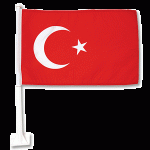Thursday
May272010
Turkey Analysis: Is the Opposition Party Changing?
 Thursday, May 27, 2010 at 0:01
Thursday, May 27, 2010 at 0:01  Joost Lagendijk, a former Member of the European Parliament for the Greens who served as joint chairman of the Turkey-EU Parliamentarians delegation, has written about the "change" in the Republican People's Party (CHP), following the election of Kemal Kilicdaroglu as party leader. In his article, Lagendijk questions whether the party is giving signals of social democracy which would push the Erdogan Government towards European Union reforms:
Joost Lagendijk, a former Member of the European Parliament for the Greens who served as joint chairman of the Turkey-EU Parliamentarians delegation, has written about the "change" in the Republican People's Party (CHP), following the election of Kemal Kilicdaroglu as party leader. In his article, Lagendijk questions whether the party is giving signals of social democracy which would push the Erdogan Government towards European Union reforms:Few people in this country realize how many European friends of Turkey would like to see the Republican People’s Party, or CHP, transform itself into a genuine, European-style, social democratic party and challenge the ruling conservatives.
Turkey Inside Line: A Political Warning from Business; Kurdish Connections
Some cherish this wish because they do not like the Justice and Development Party, or AKP’s, blend of Islamic values and neo-liberal economic ideas. Most supporters of a CHP renaissance simply think it would be better for Turkey and the AKP if there were a progressive, pro-reform and pro-EU party in Parliament that would push Prime Minister Recep Tayyip Erdoğan to be more courageous and forthcoming on reforms that will make Turkey a more democratic country and, by doing so, bring it closer to EU accession.
Is the replacing of Deniz Baykal, the ultimate status-quo defender, with Kemal Kılıçdaroğlu, the man who does his utmost to appear as a man of the people, the moment so many in Europe have been waiting for?
The question of whether or not last weekend’s explosion of hope and excitement at the CHP party convention signals a return to the good old social democratic days of the era of former Prime Minister Bülent Ecevit will be answered negatively by most analysts. They believe it does not make any sense to compare the 1970s to the present political landscape in Turkey. On top of that, they claim the CHP never was, in fact, a real social democratic party and that academic research shows there are simply not enough social democrats in Turkey to get more than 20 percent of the vote at the ballot box.
Even if we take these points for granted, however, the question remains whether we will witness a serious attempt to reposition the CHP under the new leadership.
In that sense, parts of Kılıçdaroğlu’s speech have created some hope. His switch in rhetoric from state and secularism to people and poverty went over well. This is what many in Turkey and Europe would expect from a social democrat. But what about all the other controversial issues that have split Turkish society and politics for so many years now? Why was he so conspicuously silent on the Kurdish question and refuse to go beyond the old CHP clichés on the EU?
Let’s stop here for a moment. Is it reasonable to expect Kılıçdaroğlu to radically change all CHP policies from one day to the next? Let’s not forget that the new CHP leader was a member of the Baykal team that came up with so many of these dead-end proposals in the first place. The man is, in all probability, not a closet social democrat in heart and soul who, finally freed from his shackles, will now fundamentally change the CHP in one big move. The best bet seems to be to see him as a man who has understood that continued polarization will lead the CHP nowhere and a change in style and an adjustment of some policies are therefore necessary. I am not so sure whether he already knows which ones.
Based on his personal background, I expect Kılıçdaroğlu to prepare the CHP in the short term for a compromise with the AKP on the Alevi and Kurdish questions. Apart from his private motives, electoral considerations will force the CHP to try and regain some ground among these millions of voters. But in order to keep his credibility among diehard CHP voters, I think he will stick to the party’s rejection of radical constitutional change and to the ambiguous attitude toward the EU – saying you are in favor and then voting against all reforms that are needed to get there.
It might well be that this combination of change and continuity will convince some that the CHP has become a different party under Kılıçdaroğlu’s leadership. I am afraid many others will position the new CHP leader as stuck somewhere in between a version of Baykal lite and the real reformer many in Turkey and in Europe would like him to be.



